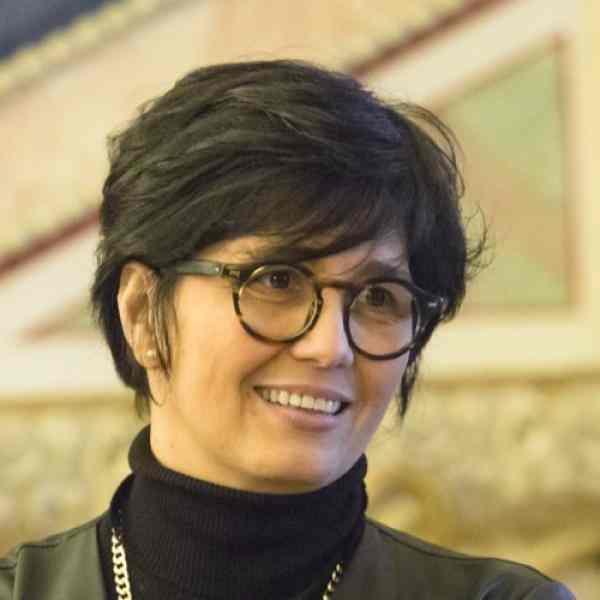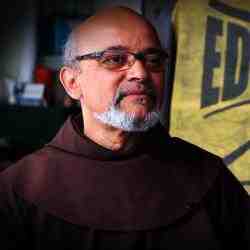Introduzione
Rosy Russo is creating a movement of responsible digital citizenship in Italy to advocate, provide tools, and normalize behavior online that is responsible, tolerant, and inclusive. In doing so, she is reversing the course that the digital world is currently manifesting, from being a place where hate speech, division and prejudice are common to a world where communication online is defined by sensitivity, awareness, and critical thinking.
La nuova idea
As the Internet and the World Wide Web proliferate, people live increasingly hybrid lives where the physical and the digital, the real and the virtual, inevitably interact. In this world, online and offline identities may overlap and interdigitate, erasing prior boundaries in social, cultural, linguistic, political, and economic domains.
The blurring of boundaries and the fusion of the real and the virtual in hybrid settings may require rethinking conventional communications rules. What we are facing is an online disinhibition effect which is the lack of restraint one feels when communicating online in comparison to communicating in-person. People feel safer saying things online which they would not say in real life because they have the ability to remain completely anonymous and invisible behind the computer screen. Apart from anonymity, other factors such as asynchronous communication, empathy deficit or individual personality, and cultural factors also contribute to online disinhibition. The manifestations of this could be in both positive and negative directions. We are facing an increase of the negative effects which ultimately has dire consequences on social and community cohesion and self-confidence among several other impacts.
Prompted by her own negative experiences as a victim of online hate speech, Rosy founded Parole Ostili (Hostile Words), with the vision of normalizing digital citizenship across all spectrums of society. Rosy believes that this new digital citizenship needs to be anchored in the values so deeply enshrined both in her country’s constitution but also in common humanity. She is working to create awareness, capture commitments and drive action towards the education, prevention, and championing of this new type of digital citizenship. In doing so, Rosy is building a future for Italy that can co-exist and thrive with digital media as it being a tool to promote unity, co-operation and growth for individuals, groups, and society.
To drive this normative shift, Rosy is taking a multi-step and multi-stakeholder approach, spreading her energies across all spectrums of institutions in Italy. By working with stakeholders such as sporting organizations, government bodies, the media, and businesses, she is both changing mindsets about the importance of civility through digital communications as well as the role each of them have to play in championing this across their own networks of stakeholders. Similarly, Rosy is creating and equipping key stakeholders with the resources and tools they need to drive wider awareness and action in all parts of Italy. Rosy’s approach is not to follow the commonly accepted route of punitive action against hate speech but is rather embedded in activating the common sense, commonality in human experience and compassion across audiences. She is doing this by creating a common and accepted language and rules around what digital citizenship should look like and then making accessible the vision for how to get there.
Rosy believes that in a virtual world where exaggeration and distortion of reality seem to be the norm, the temptation to lie or stretch the truth is becoming pervasive. This is particularly risky and true for the current young generation, who could start to see this distorted and accepted online behavior as what to expect from the world outside. By developing a shared charter that sets rules, commitments, and expectations to digital citizenship, Rosy is using this as a north star to kickstart societal level activity and action to allow everyone to adopt languages and behaviors that disrupts prejudice and discriminatory practices.
Il problema
The internet supports a global ecosystem of social interaction. Modern life revolves around the network, with its status updates, news feeds, comment chains, political advocacy, omnipresent reviews, rankings, and ratings. For the first few decades, this connected world was idealized as an unfettered civic forum: a space where disparate views, ideas, and conversations could constructively converge. Its creators were inspired by optimism, and it led to the creation of platforms idolized and visited by millions globally, such as Reddit which was the dream and creation of founder Aaron Swartz. The digital world was and is meant to be the most revolutionary tool of our generation.
As digitization becomes increasingly part of daily interactions, antisocial behavior such as trolling, harassment and bullying are of growing concern. Not only does antisocial behavior result in significant emotional distress but it can also dilate to offline harassment and threats of violence. What is most concerning is that this type of behavior is widely prevalent, with a recent study by CNN showing that approximately 40% of all internet users faced online harassment and every one in five comments being removed by moderators on platforms due to inappropriate behavior. A paper by Stanford University in 2017 postulates that antisocial behavior can commonly be observed in online public discussions, whether on news websites or on social media. The current and most dominant method to combat this is largely reactionary and includes comment tanking, and moderation and interaction redesigns that encourage civility. Several websites have gone onto completely ban commenting and deeper engagement on their websites. The majority of digital platforms, however, are failing to curb the problem at its core, thus allowing this behavior to fester and grow.
According to an article published by The British Journal of Criminology in January 2020, national governments now recognize online hate speech as a pernicious social problem. To examine the link between online activity and offline consequences, researchers statistically modelled the effect online hate speech had on the incidence rate of hate crimes on the streets. The study found that an increase in online anti-Muslim and anti-Black speech on Twitter is associated with an increase in racially and religiously aggravated violence, criminal damage, and harassment in the UK, Germany, and USA. This statistical association remained when controlling for factors known to predict hate crime, including educational attainment, age, employment, and race. Predictions showed that in an area with a 70% black and minority ethnic population and 300 hate tweets posted per month, the incidence rate of racially and religiously aggravated violence increased by up to 100%.
Most experts predicted that the builders of open social spaces on global communications networks will find it difficult to support positive change in “cleaning up” the real-time exchange of information and sharing of diverse ideologies over the next decade, as millions more people around the world become connected for the first time and among the billions already online are many who compete in an arms race of sorts to hack and subvert corrective systems. Those who believe the problems of online “trolling” and other toxic behaviors can be solved say the cure might also be quite damaging. “One of the biggest challenges will be finding an appropriate balance between protecting anonymity and enforcing consequences for the abusive behavior that has been allowed to characterize online discussions for far too long,” explained expert Bailey Poland, author of “Haters: Harassment, Abuse, and Violence Online.”
Rosy believes that the solution isn’t to deter liberties of the individual but to empower users with a common and new digital citizenship identity that is based on common values both online and offline. She is building the societal architecture to ensure that all citizens in Italy are aware, educated, and championing empowering digital ownership.
La strategia
Rosy is taking a multi-stakeholder approach to address the rampant problem of anti-social behavior online. She is shifting the recognized and accepted strategy of ‘course correction’ to one where a normative shift is created in her country that pulls institutions, organizations, and individuals to identify as champions of positive digital citizenship. By creating a shared identity through a set of accepted values and rules for engagement online, she is slowly changing the perception of what it means to be a participant and receiver of all the online world has to offer.
As a first step, Rosy realized that it would be important to create a shared identity and set of rules which could glue a growing community together. To Rosy, a community with passion but no direction is bound to collapse and thus it was important to define what positive digital citizenship could be. To do so, she reached out to thousands of citizens across heterogeneous segments of her country to understand from people what they expect from digital citizens. This weaving of perspectives led her to launch a manifesto named ‘The Manifesto of Non-Hostile Communication’ which was an accumulation of 100 different points. A further co-creation process with citizens led to a final agreed upon document being created, stating 10 universal rules which form the blueprint of responsible communication and digital citizenship. This manifesto is constantly updated through consensus-based decision making from ‘members’ who become signatories. It sets the North Star for virtuous practices, including communication over the web and promotes a broader awareness of individual responsibilities. So far translated into 33 languages, the manifesto’s shared rules are:
1. Virtual is real - On the Internet, I only write or say what I would dare to say in person.
2. You are what you communicate - The words I choose define who I am. They represent me.
3. Words shape the way I think - I take all the time I need to express my views in the best possible way.
4. Listen before you speak - No one can always be right, and nor am I. I listen, with an honest and open-minded attitude.
5. Words are bridges - I choose words to understand, make myself understood and get close to others.
6. Words have consequences - I am aware that what I say or write can have consequences, small or serious.
7. Share with care - I share texts and images only after I have read, assessed, and understood them.
8. Ideas can be discussed - People must be respected Those whose views and opinions differ from mine are not enemies to be destroyed.
9. An insult is not an argument - I accept no offensive and aggressive words, even if they support my point of view.
10. Silence says something too - When it’s better to keep quiet... I do.
Rosy’s organization initially has taken a focus to key areas of society: childhood, politics, sport, inclusion, public administration, and science. The reasons for focusing on these specific areas is evidence based and covers a large proportion of the citizen base and workforce that is digitally engaged. Rosy’s first step is to use advocacy methods to identify key organizations, individuals and/or institutions who are willing to become torchbearers for this manifesto. Usually the low hanging fruit are ‘lone wolfs’ who are an important variable in a larger system, such as the football club or player that is actively vocal about addressing the issue of abuse online. Once she identifies these potential signatories, her team works to engage them and bring them on board into the community. The community’s capacity building portals include many online and offline resources that equip new signatories to run trainings, speak up about digital citizenship and other relevant issues, engage larger audiences and broader education related tools. Parole Ostili has authored and co-authored several books, papers, and journals to continue building knowledge and evidence in the field that is accessible to a wider audience.
An example of a recent signatory is football giant, AC Milan, one of the world’s largest football club’s worth close to $600 million and having over one hundred million fans across all corners of the world. As a signatory to the ‘Manifesto of Non-Hostile Communication in Sports,’ AC Milan’s commitment to using the values of sports to end all forms of hate and prejudice, especially online is especially aligned with the vision of Parole Ostili. AC Milan has started to invest resources into addressing the issue by launching their own ResPACT movement, with the aim to create a more responsible, inclusive, accessible, and open environment around the club. A big part of that is focused on the Awareness, Prevention, Education and Collaboration to promote stronger digital citizenship. AC Milan is now using the capacity building tools and support of Rosy’s organization to focus on addressing issues such as the prevention of ‘hate speech’ online, especially towards the most vulnerable communities among its fan bases. The club is looking to educate and driven campaigns among fans to champion this value and mission of the club they love. Rosy and AC Milan both believe that modelling the manifesto will lead to many other of the largest sporting clubs and apex bodies to sign the signatory, creating a much larger investment pool in action and resources. The goal for Rosy is to accompany this with advocacy with bodies such as the Serie A, the largest football association in Italy.
Rosy operationalizes the principles of the Charter in different fields and contexts of real life. In politics, politicians are invited to adopt a respectful language, both online and offline, in confronting their opponents and in creating political speeches; in public administration, compliance with the Charter paves the way for a respectful dialogue between citizens and public actors; a fundamental premise for civic participation; with companies, a transparent and sincere dialogue must be built among various stakeholders and clients, the manifesto for the private sector provides guidelines on how to do it. Similarly with children, parents, and educators, Rosy is developing awareness towards digital tools and the online world and the scientific community as a stakeholder group is working towards science and research that is respectful and non-biased. Rosy’s growth of this community is both inbound and outbound, slowly growing organically as more stakeholders are demanding being associated with this movement. An important strategy to strengthen community cohesion and draw examples of practical application of the manifesto in real life is through peer-to-peer exchanges. Rosy and signatories themselves regularly curate these spaces for sharing of experiences, opening up opportunities for collaboration and celebration of successes.
Rosy sees the childhood category as a key stakeholder, especially teachers and students. Most young people are susceptible to the vulnerability of the exact problem Rosy is trying to solve and this manifests into a loss of self-esteem, depression and in an alarming number of cases, a rise in youth suicide. Parole O-Stili has developed a cadre of resources, gamified, and adapted to educators and students to promote civility and awareness of behavior in the digital world. By taking a ‘train-the-trainer’ and ‘peer-to-peer’ model of education, the material is now being owned by schools and stakeholders within them. The process of having this within their education encourages students to become digital students who have the skills to apply critical and responsible thinking. In many of the schools where these tools have been adopted, students and teachers are actively sharing best practices, openly speaking about their experiences and problem solving themselves. Rosy’s organization is now in conversation with the Minister of Education to activate the resources of Parole O-Stili into national curriculum. Further, to accelerate the spread of these tools further, the partnership with the education department also has a focus on the investment of an online platform for youth across Italy. This will allow the tools to be accessible lifelong and new materials to constantly be updated in an efficient manner. Some of these tools also include teaching materials for educators to access and adapt in their own manner within their classrooms.
Rosy has so far also drafted ten books targeted towards children and youth that activates ideas about good digital citizenship, published by well-known distributors. By partnering with a major Italian phone manufacturer who provide a book with the purchase of a young person’s first mobile phone, Rosy is further spreading access to these resources. To further the influence of her work, Rosy has positioned herself as a lead advisor with the Ministry of Technology and Innovation in Italy to map and study hate speech in the country, it’s impacts, and systemic intervention can help curb this disease.
From a last survey launched by the organization, one of every ten Italians is familiar with Rosy’s work. One of the key areas of collaboration for Parole O_Stili is with companies, having partnered with prominent organizations such as Google Italia, Netflix, Ikea, Bayer, AC Milan, WindTRE, TIM, and many others to develop training and communication projects centered around vital themes like diversity & inclusion, digital citizenship, and non-hostile communication. Recently, the collaboration with Huawei led to a significant initiative wherein a technological bus toured 15 Italian cities to raise awareness among students and citizens about cybersecurity and privacy issues. In the education sector, Parole O_Stili has made significant contributions by providing training sessions and designing educational content for schools. Their partnership with the Ministry of Education resulted in the creation of "ancheioinsegno.it," a digital platform offering more than 400 free materials for teachers. Over a million students have worked with the Manifesto during the last year, and approximately 250,000 teachers have utilized the platform for their teaching needs.
The association's engagement with Municipalities has been substantial, working on projects that involve citizens and schools alike. More than 400 mayors throughout Italy, including those from major cities like Milan, Turin, Bari, and Palermo, have endorsed the Manifesto, demonstrating the widespread impact of their work at the local level.
Parole O_Stili has successfully organized national-scale gatherings that have attracted around 10,000 participants over the years. So far over 25,000 organizations have become signatories of the manifesto along with hundreds of thousands of other individuals. Many of the signatories include local city councils all over Italy and other major organizations, who are investing their own money and resources to push this agenda forward now. The engagement so far with 850,000 students and 170,000 teachers in combating hate speech has had a significant impact on reducing incidents online. According to independent impact data collected, high schools where the program has been implemented for at least 5 years have decreased digital incidents of hate speech and discrimination between 60% to 20%. Rosy is continuing to track granular level data by partnering with the government and academic institutions so that there can be any course correction where impact is not as strong, while strengthening programs that are working.
Moving forward, Rosy is continuing to look to innovate methods to further her reach and activate digital citizenship. Most recently, she has curated an online competition for citizens to come up with new ideas on how this agenda can be pushed further and the awareness raised as a result of this led to 100,000 new individual signatories and participants in certification.
La persona
Rosy’s earliest influences in her life that she recalls was during junior school where she took Classical Studies. It was during this tenure that she became fascinated in the connection between communication and human interaction. This led her to study design and communication in the city of Verona and into a private sector career as a communications consultant. Rosy’s early career helped her develop fundamental entrepreneurial skills by shaping business strategy and helping her organization grow. This set the foundation for her to launch her first venture, Erreguaadrato, which was focused on using strategic communication to launch and support public campaigns, such as helping local political drives. Rosy’s studio quickly gained traction and a reputation for creating communications output that was ‘out of the box,’ with a strong emphasis on humor. It led to several quality clients signing up to her organization for their services and advice.
Around the beginning of the new millennium, Rosy realized the need to adapt to new technologies and platforms such as social media. She was able to foresee both the risks and opportunities that came with such rapid democratization and access to digital media. Leveraging this understanding, she saw an opportunity to use emerging social media platforms and other communications strategies to promote her hometown of Trieste in Italy. She launched #TriesteSocial as an international cross platform initiative and using positive communication methodologies to drive new tourism and cultural awareness about the region.
Carrying this very personal success and the joy of her four children with her to Southern Italy in 2013, she realized her deep interest in the intersection between social media and societal impact. She launched Uauacademy, a media company focused on both the creation of innovative media content and also managing social media communications for tourism, political and non-profit sector actors. During 2016, while working on a tourism campaign on social media for a client, Rosy made a simple grammatical error on a post which had dire consequences. She received hate, hostility, and disrespect from anonymous posters on social media, which ultimately had a deep but important impact on Rosy. She internalized and experienced for the first time the ‘other’ side of this new reality that we are living in and without mass normative shift and/or stringent regulation, the potential for platforms such as social media to be a launchpad for hatred, division, and prejudice in her country.
This incident propelled Rosy to reach out to 70 of her friends to conduct a survey. During this survey she wanted to understand the perception of the impact that words can have on individuals and communities, whether others faced similar situations and what could be done about it. She was surprised to find that a vast majority of this small informal group of respondents had faced similar situations in their own lives but, more importantly, each one of them had been thinking about the question of what could actually be done about it.
This provided Rosy with the inspiration and commitment to address the issue at the source. She spent a considerable amount of time studying the extent of the problem at a national and global level and associated herself with multiple, critical stakeholders in this learning journey. The large scale of information gathered set the foundations for Parole O_Stili, a movement to develop and drive digital citizenship based on the values of care, compassion, and consideration.




